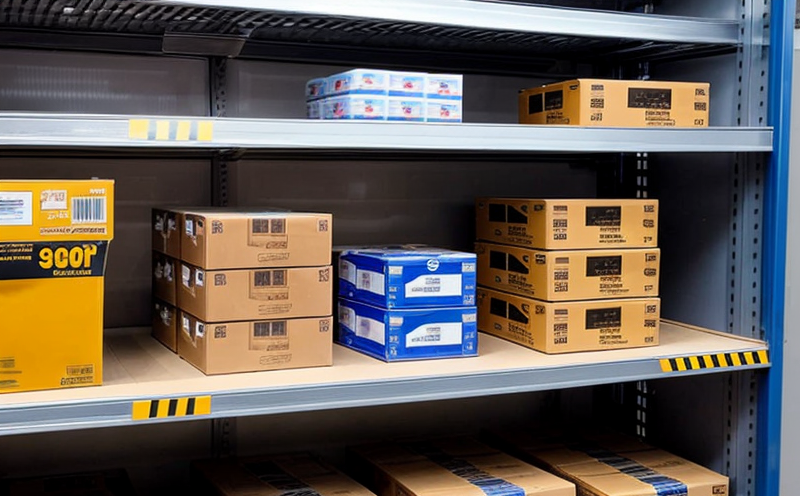ASTM D4577 Compression Testing of Shipping Containers
The ASTM D4577 compression testing method is a critical standard used in the medical device industry to ensure that shipping containers are capable of withstanding the stresses encountered during transport. This test evaluates how well the container can handle external loads without compromising its integrity or affecting the shelf life and safety of the enclosed medical devices.
The primary goal of this test is to ensure that the packaging provides a suitable environment for maintaining the quality, safety, and efficacy of medical devices throughout their distribution lifecycle. By adhering to ASTM D4577, manufacturers can demonstrate compliance with regulatory requirements and enhance customer confidence in the product's reliability and safety.
The testing process involves applying incremental loads to a specimen representing the shipping container until it reaches its failure point or specified maximum load limit. This procedure simulates real-world conditions such as stacking during transportation, handling at distribution centers, and storage in various environmental conditions. The test ensures that the packaging remains intact, protecting the contents from damage due to mechanical stress.
During specimen preparation, careful attention must be paid to ensure that the sample is representative of actual shipping containers used in the industry. This includes selecting appropriate materials for constructing the specimen based on the intended use and expected environmental conditions. Properly prepared specimens are essential for obtaining accurate test results that reflect real-world performance.
For successful ASTM D4577 compression testing, specialized equipment is required to apply controlled loads uniformly across the width of the container base. High precision load cells measure the force applied during each increment, providing detailed data on how much stress the packaging can withstand before failure occurs. Environmental chambers may also be used to simulate different temperature and humidity levels that could affect the performance of the container.
Acceptance criteria for ASTM D4577 compression testing are stringent but necessary to guarantee product integrity and safety. Containers must pass all specified load increments without exhibiting any signs of damage or deformation that would compromise their ability to protect enclosed medical devices effectively. If a container fails during the test, it indicates potential flaws in design, material selection, or construction methods which need addressing before commercial release.
The importance of ASTM D4577 cannot be overstated; it plays a vital role not only within individual companies but also across entire supply chains involved in distributing medical devices worldwide. By ensuring consistent quality and reliability through rigorous testing procedures like this one, manufacturers contribute significantly to public health by preventing substandard products from reaching consumers.
Why Choose This Test
Selecting ASTM D4577 compression testing for your shipping container is essential because it provides robust evidence of the packaging's ability to protect delicate medical devices during transportation. This test offers several key benefits:
- Enhanced Product Integrity: Demonstrates that the packaging maintains its structural integrity under stress, safeguarding the contents from potential damage.
- Regulatory Compliance: Ensures adherence to international standards like ASTM D4577, which helps avoid costly legal issues and ensures smooth compliance with regulatory bodies worldwide.
- Customer Trust: By proving that your products are protected against external forces during shipment, you build trust with both internal stakeholders and end-users.
- Cost Efficiency: Identifying weaknesses early in the development process allows for improvements before large-scale production begins, reducing waste and rework costs significantly.
In summary, choosing ASTM D4577 compression testing is crucial not just because it meets necessary standards but also because it provides peace of mind knowing that your medical device packaging will perform reliably under challenging conditions. This translates into safer products reaching patients sooner, benefiting everyone involved in the supply chain.
Quality and Reliability Assurance
The ASTM D4577 compression test is integral to maintaining high standards of quality assurance within the medical device industry. It ensures that shipping containers are not only durable enough to withstand transportation but also maintain their protective properties over time, especially concerning shelf life.
Quality and reliability assurance go hand in hand when it comes to shipping container testing. By subjecting these packages to controlled compression forces according to ASTM D4577 guidelines, manufacturers can identify potential weaknesses early on. This proactive approach allows for timely corrections before mass production begins, thereby minimizing risks associated with compromised packaging.
Moreover, consistent application of this test across different stages of product development helps maintain uniform quality standards throughout the supply chain. It ensures that regardless of where or how medical devices are transported globally, they remain protected from external factors like shock, vibration, and temperature fluctuations.
In terms of shelf life testing specifically, ASTM D4577 plays a crucial role in evaluating whether packaging affects the longevity of enclosed products. For instance, if excessive compression leads to premature degradation of materials used within the container, it could shorten the effective storage period for certain types of medical devices. Therefore, ensuring compliance with this standard helps maintain accurate shelf life expectations, reducing waste and optimizing inventory management.
By integrating ASTM D4577 into your quality control protocols, you demonstrate a commitment to excellence that resonates positively among customers, partners, and regulatory bodies alike. Ultimately, it contributes to building stronger relationships while enhancing overall brand reputation.





